The Mad Men Finale Kicked My Ass
I love the ends of things.
As much as I hate to see a story I love go away, I’m always terrified it won’t end. That the story will drag on, teeth growing longer and longer, fatigue drinking away all of the good will reserves I’ve been building for years (coughHowIMetYourMothercough). It’s a fine line, what’s too long for a television show, what’s too short. All I know is that if I’m ready for it to end, they’ve gone too far.
And it’s easy to forget that the end of a story is the most important part, if done correctly. While the journey may be more important than the destination, it’s the final statement in a piece of fiction that tells you everything you need to know about the story. If the final episode ends optimistically, it colors everything that came before – you understand what it was all building toward. If everything ends in ruin and destruction, you realize that the story was about futility, or possibly about the struggle to succeed being just as noble independent of the outcome of the struggle.
Unlike a good essay, the last episode of a television show (or the last chapter of a book, or the last scene of a movie) is where the thesis statement lives. What was the story about?
Who Done It Right?
Sitcoms almost universally fail the test of finales, simply because sitcoms aren’t really about anything. I realize that sounds needlessly dickish, but it’s important to remember – most sitcoms are nachos. Now, in defense of nachos, the Aztec Queso God (Quesocoatl) didn’t make all nachos equal. Some nachos exist as beds of stale chips drowning in cold liquid cheese, the kind that you can also use to grease the guts of an industrial bailer.
Other nachos or more substantial, substrates of chip and real cheese and spiced ground beef, sprayed with onions and little green things and discs of the noble jalapeno pepper.
Dramas have a better time of it, because dramas have themes. Generally. Not like, CSI, but the good ones. Star Trek: Next Generation closed the curtain with “All Good Things,” and contrary to almost all of their season finales, was only one hour long. No two-parter, no epic confrontation with fan-favorite villain the Borg, no big fight with the Klingons or Lore or any number of spectacular villains. Instead, Picard faces an intellectual challenge involving time travel, one that shows him what life was when he started on the Enterprise, where he is now, and where he (and the cast) may someday be.
The climax happens inside Picard’s mind – he has a fantastic leap of logic that saves the day (combined with the teamwork of three time-tossed Enterprises). The show ends how it lived – a beacon of hope for what humans are capable of. What we are now, and what we might become some day with effort, teamwork, and an insatiable curiosity.
The Mad Mens
Let’s get to the brass tacks of it all – last night I sat down with my wife, poured a rye over ice, and watched the series finale of “Mad Men.”
When I bought the last episode on Amazon, strings of tension inside my stomach tightened. When I clicked play, the strings began to play a ballad of fear. I love the ends of things, until I don’t. Mad Men is a nearly perfect show that’s had only one dip in quality that I’ve ever seen (the first few episodes of season six, for trivia), and even then it’s only notable for producing a string of “only kinda great episodes” instead of “utterly wonderful.” I was terrified it was going to be bad, or worse, that it was going to be great but that it would close the show on a sentiment I didn’t want.
Here’s the part where I get into massive spoilers, so beware – if you haven’t seen the ending, this is going to ruin everything. Please only continue if you’ve watched it – if you haven’t, go watch it. If you’ve never seen the show, start on episode 1 “Smoke Gets In Your Eyes” and come back in six months. The show is too good to let it be spoiled by some internet asshole – I would feel like a jerk for ruining one of the finest shows on television show. Don’t make me a jerk.
Okay, now that that’s out of the way . . .
The Girl or the Tiger
I’ve been watching the show for five or six years now – the night after my wedding, me and my wife’s greatest priority was making sure we caught the season six premiere (which was disappointing, as I said earlier. The wedding was the opposite of disappointing, so that soothed some of the sting).
I’ve had no clue what kind of show it was this entire time. Did Mad Men truly embrace its nihilistic tendencies? Was it telling me about the futility of struggle, of work, of ambition? Was it describing a Randian universe where hard work and dedication leads to victory? Was it about the fall, rise, or death of Don Draper? Was it just a really artful soap opera? What is it?!
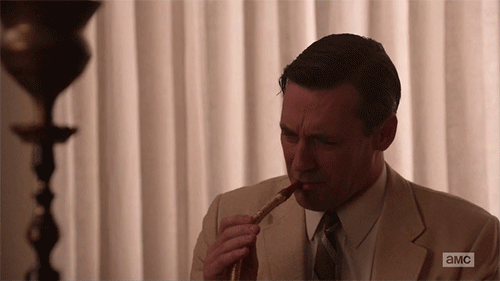
The question drove me into shades of Lovecraftian madness, and the show played it coy with the answers. Some episodes were astounding paeans to American zeal and asskickery, others mournful deconstructions of the costs of an era that marginalized women, minorities, gay people, or really any person that wasn’t a type-A-for-asshole whisky-swilling bro in an expensive suit. It flirted with all of these concepts and none, portraying an unflinching look at the good, the bad, the ugly and the oddly artful quality of the ’50s/’60s zeitgeist.
So when I say I felt tension when I started the episode, it’s because I didn’t know. I didn’t know what kind of show Mad Men was, and here, before me, lay the answer. Just 57 minutes later I would know what the last five years were about. I saw the shadow of the massive shape above my head and wondered if it was a cloud or a B2 Bomber.
Person to Person
In those last 57 minutes, Mad Men creator Matthew Weiner finally illustrated the theme, at least to me. Obviously any Mad Men episode is a Rorshach test, but here’s what I saw in the inks:
Pete Campbell
I saw Pete Campbell’s hard-earned inner reflection and hope for the future put his family back together. I saw him get aboard the same kind of airplane that killed his father with a smile on his face – the poison in his past held no more sway over him. His Gatsby-like desire to recapture the best of the past and throw away the worst was actually successful. Pete Campbell was always an enigma – a “what’s in it for me” upstart shark with the incongruous prescience: he saw the Civil Rights movement coming, he made the push to hire African Americans, and he never treated them any different.
Pete’s weakest moments were when he attempted to live up the “American Male” standard of his more successful coworkers – Don’s complexity and (let’s be honest) good looks made his womanizing appear somehow romantic. When Pete cheated on his wife, he was just a scum bag. His attempts to live up to that shell – the “Don Draper” shell – always destroyed him. His sensitive insight, to contrast, always uplifted him. In the end, he let go of who he wanted to be and embraced who he actually was, and he boarded that Lear jet with his family in his arms and a guileless smile on his face.
Roger Sterling
Roger Sterling is the living totem of “lazy, smartass rich kid who inherited his fortune,” and it’s bored him across the entire show. Roger Sterling is not a businessman – he never was. All of his business ventures were essentially handed to him – his entire worth to the company was based on the Lucky Strike account that his father had dropped in his lap. And his name, of course. Roger Sterling “lived the past twenty years like he was on shore leave,” a fact he lamented. Roger always reached out to try to find something beyond his boredom – drugs, secretaries, the unhaveable Joan.
Roger tried to live up to the “businessman” he inherited from his father, and it always ended shittily. He lost Lucky Strike at the first ounce of trouble. After Bert Cooper (the real businessman and captain of SC&P) died, Sterling tried to step further into the ill-fitting role. He ended up selling the company to McCann to save it from Jim Cutler, which ultimately destroyed the company and sent most of the cast into a death spiral.
With his relationship with Megan’s mom (and now more money then he’d ever know what to do with), Roger found someone who would never make him bored again. She’s as smartass and wild as him (plus she’s got that special brand of French madness), a fellow bon vivant who’s only interested in a life well-lived. Of taboo’s being explored, or drugs and drink and sex. Roger let go of his “businessman” shell and finally embraced who he was – a swashbuckler on the sea of life. He’ll never be bored again with her by his side.
Betty Draper
Betty Draper in her kitchen, smoking the cigarettes that killed her, reading the paper, her schoolbooks spread out before her. Sally Draper doing the dishes, handling the affairs. Even Bobby Draper got a clue (for once). Don Draper listened to what Betty said – he respected her wishes by not coming out, by not seeing her fading away, by not trying to shake up the kid’s lives.
In the end, Betty Draper was allowed to live the life that she wanted. She never wanted to grow old, she never wanted to lose her beauty – she spoke volumes about how lucky it was that her mom died when she still looked gorgeous. When Sally Draper told her she loved the tragedy of it, she was half right – Betty doesn’t like scandal or tragedy, but the cancer’s death sentence almost comes as a perverted relief to her. She will die in a beautiful dress with a beautiful face, and no one will ever have a memory of her that wasn’t pretty.
And, in the end, the men in her life finally respected her wishes. She took the power over of her own life, however small. It’s an esoteric happy ending, but once again, we see it – Betty Draper is forced to discard the shell of the perfect housewife or the political foil or the mother (which she never really was), and embrace who she really is. In that small victory, she dies perfectly as herself.
Joan Harris
Oh, Joanie Joanie Joanie. In a weird way, her and Don were the two I was most worried about. Both seemed on the edge of failure this season – they were the ones most affected by the move to McCann. They both fled upon contact with that cramped, backwards, wood-paneled factory.
Joan has always been a woman of duality (not that everyone on Mad Men isn’t similarly afflicted). In her, two Joans waged war – the “beautiful trophy,” the one who had the dalliances with Roger, the one who married the handsome doctor, the one who connected so thoroughly with sex-voiced dignity-engine Bruce Greenwood (I don’t remember his character’s name, so I’m going to call him “Captain Pike” from here on out). That Joan loved the way men looked at her, that Joan used her wiles to seduce men, that Joan wanted to be the curvy femme fatale. We’ll call her “Holloway.”
The second Joan, the real Joan, (we’ll call her “Harris” because of what she learned with that name), bristled inside. Whenever Holloway convinced a man with sex (or the promise of sex), Harris recoiled at how men treated her afterward. She wanted the power, she wanted equality, but every time her own desire to play the femme fatale stymied her. The men who knew who she really was (Don, Lane Price, Bert Cooper) respected her for her incredible talent and inner strength – perhaps not coincidentally, all men who didn’t see (or treat) her as a sexual object. And, more importantly, they’re the men she didn’t try to win over with sex.
Don’t get me wrong – I’m not saying that Joan created this dynamic. Men viewed her as a sexual being because of the nature of the era, and because men can be real assholes when they’re raised to be believe women are objects. The Holloway Joan was a reaction to the unfortunate time period she was born into – she had to use sex as a weapon, because it was the only weapon they didn’t take away from her. However, living on the cusp of social progress, she realized there were other ways to get power – long after she’d trained herself as a kind of sex assassin.
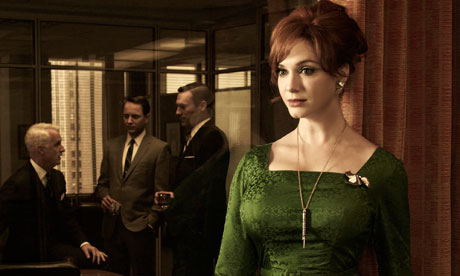
The Joans wanted power, they wanted equality, but Holloway represented the old way, and Harris the new. In many ways, the American woman’s fight lived inside of her.
Which is why you could call these last few episodes “The Last Temptation of Joan.” Forced out of McCann after she realized that she was born about three decades too soon for a massive sexual harassment suit to get any traction, Joan took the money and ran. She had the perfect adventuring companion (Captain Pike), a handsome, rich, caring, wealthy man who was completely entranced by her sexual wattage and free-wheeling personality – this man loved Holloway, and Holloway could go with him and live happily ever after.
But Holloway is a shell. The real Joan said it best, “I can’t just turn it off.” She can’t shut off her drive to want to build businesses, to have her name on the door, to carve women’s power out of rock. She’d be happy as a world-traveling trophy wife, but she wouldn’t be herself. She’d be embracing the shell. When she finally gives him up in order to start her own production studio (Holloway-Harris Productions, aptly enough), she becomes the real, powerful executive who doesn’t have to answer to men. Her truest self.
Peggy Olson
Peggy Olson’s transformation from mousy secretary to BAMF (bad ass mother-fucker) has been enlightening. My wife said it best – “Joan is interested in raising up women, while Peggy is interested in raising up herself – her being a woman has never factored into it for her.” Which is true – in many ways, Peggy almost laments being a woman.
Her rejection of motherhood, her rejection of all of her relationships – she’s tossed away all traditional female “needs” in order to pursue her career. In many ways, Peggy is the anti-Joan. Peggy never embraced femininity as a tool, and was punished for it just as harshly as Joan was for embracing it. The two of them illustrate just why women have such a hard time in the work place – if they’re feminine, they’re seen as silly sex-bunnies (Joan), and if they’re masculine they’re seen as cold bitches (Peggy). It’s an absolutely maddening dynamic, and the tension between the two characters springs from it – they both think the grass is greener on the other side.
Which is why Joan’s attempted business seduction was so perfect – the two were trying to meet in the middle. Peggy Olson has always wanted to advance as quickly as possible, because she believes she always deserves – sometimes she does, sometimes she doesn’t, but that’s the curse of the ambitious. She’s never happy where she is, and she believes she’s better than her superiors. She wants to be creative director, like, yesterday. She wants her name on the door tomorrow.
Though I would have LOVED to watch a show about the Harris/Olson Production Company, it wasn’t right for Peggy. Joan’s success is Peggy’s Last Temptation – to embrace the version of Peggy she wants to be, the version of Peggy who puts accolades and titles above the work. The false Peggy. Instead, she decided to stay at McCann and do the work she loved. But also, weirdly enough, to earn the job of Creative Director. She doesn’t want a position handed to her that’s kind of like what she wants. She wants to take it. And by staying at McCann, that’s exactly what she’s doing. Plus, now that she’s become the spiritual successor to Roger Sterling’s “give no fucks” attitude, we know she’s going to succeed.
Peggy, being the anti-Joan, also found the opposite solution as Joan to another problem. Joan had to reject her suitor to become her truest self, so, of course, Peggy had to embrace her suitor to achieve the same effect. For Joan, being the trophy wife was the false persona. For Peggy, being the cold, unsexual woman was a false persona.
Peggy Olson is a very lonely person – she’s rejected romantic relationships as a distraction, forgetting why we have them in the first place. A woman isn’t empty without a man, but people feel empty without someone to love. Colder. Harder. One of the greatest themes in Mad Men is about connection between people, (there’s a reason the last episode is called “Person to Person”) and no one has rejected that connection more than Peggy. And yet, we see her flailing attempts to reach out to Abe, to Ted, to Duck, hell even to the weird surrogate son in her building who just swings by to watch TV.
In Stan, Peggy found a connection that had snuck up on her. The scene where Stan and Peggy stumble upon their love for one another is one of the most brilliant scenes not only in the show, but in TV history. I’ve never felt more like a squishy romantic douche than I did during that short but beautiful moment. Stan and Peggy really were all the other one had, and moreover they’d earned each other’s respect over years of struggle.
It wasn’t about Peggy “finding a man,” but about Peggy finding the version of herself that could be in a relationship without sacrificing her work. Abe hated her work, Ted hated his own work, and Duck was a hot mess who kept trying to pull Peggy away from SC&P. In Stan, she found a partner, a friend, and one of the few people (besides Don) who understands how important the ad game is to her. The artfulness of it, the need.
Peggy rejected her shell (greedy, cold, unloving) and became her truest self – a damned good writer with pluck who was strong enough to make personal connections.
Don Draper
We come finally, at last, to the man. The myth. The legend. No, not Hercules, though he may be some kind of American Hercules, a mythological character of strength and power who’s deeply alcoholic with a lot of mommy/daddy issues.
Don is Mad Men. Every thematic statement on the show flows through him before bouncing to others, like the spell “Chain Lightning” in Dungeons & Dragons. And like Chain Lightning, the first target hit takes the most damage.
The question of “who is Don Draper” has been answered over the last few seasons, but the question “who is Don Draper going to become?” is the one that caused that stomach fear I mentioned in the first few paragraphs of this increasingly lengthening article. Because Don Draper was always the middle stage of transformation, the chrysalis that Dick Whitman crafted with a few well-placed dog tags.
Bert Cooper described Don Draper best when he said that “a man is the room that he’s in.” Don Draper personifies that strange compartmentalization of which (mostly) men are so capable. It’s one of our greatest strengths, and one of our most terrible weaknesses. Being able to kill a man in a trench in war and then go home and work in insurance sales is a powerful tool, but it’s also the same tool that allows a man to stick his schwanz in his secretary at a Christmas party and then tell his wife that he still loves her.
Don Draper doesn’t know who he is, so he’s constantly exploring. That’s why Don gets so fucking weird and nebulous the further he is away from his family or his workplace – those constructs begin to evaporate, and he has to be whoever is appropriate for the moment. It’s also the reason the California episodes always feel like strange fever dreams. If it’s appropriate to do a bunch of drugs by a pool with some naked Europeans, then that’s who Don Draper is. If it’s appropriate to be a test driver in Utah, that’s who he becomes. If he’s the handyman, he’s the handyman.
Don is always the room he is in. If he’s in an ad meeting, he’s pitching those killer Don Draper monologues. If he’s dating a hippy, then he’s going to beat poetry slam sessions and listening to jazz.
The last few episodes have been testing that theory to the breaking point. Who is Don on the run? We see a man unspooling in front of us. At the pitch meeting where he walks out, Don has realized he has no fucking clue what he wants. So, in true Don fashion, he runs away from his problem and tries to hide in the vagina of another dalliance – the crazy waitress (I also don’t remember her name, so let’s call her Esme).
His first move is to embrace the runaway coward, the womanizer, the “start-all-over” guy. He’s been threatening to start all over again since Season 1, when Rachel Menken basically laughed in his face about the absurdity of the idea. But now that he doesn’t have a wife (again), his family doesn’t seem to need him, he hates his job, and he has a shitload of money – Don can finally embrace his fantasy and just get the hell out of Dodge.
His first stop takes him to Esme’s former house, where he bullshits a lie that Esme’s husband immediately sees through. The guy is a Grade-A jackass, but he has Don’s number (probably because he’s so used to his own wife’s bullshit lies and runaway tendencies). Don finally realized that Esme isn’t a romantic pursuit, but a truly disturbed woman. She wasn’t running so Don could chase her, she was running because she’s got a pathological problem. Just like Don.
Don abandons the quest because it’s basically impossible to find her. Here, Don loses another piece – he’s already lost his wife, his job, and even the furniture in his apartment, and now he’s lost his mistress. The pieces that make up Don Draper are falling apart. He’s giving them up so he can continue forward – the whole thing reminds me of Inanna’s descent to the underworld in Babylonian mythology. Not to get too Dennis Miller with my references, but Inanna was forced to give up seven articles of clothing, one at each gate to the Underworld. She stripped her power and belongings away to become nothing, to make the journey.
Don keeps giving up things as he travels, fetishes of the “Don Draper” persona. When he plays the part of the veteran, he realizes he isn’t playing a part. He really was in war – he really did experience horrible things. Though he came the veterans’ fundraiser as Don Draper, he spoke as Dick Whitman. Here, he gave up another fetish – the secret of the war. Don finally admits to one of his greatest secrets, and the other men don’t care. They support him. He leaves that pain on the table. Another piece gone.
With the young, failing con artist, Don gives away his car – the most obvious, potent symbol of his Don Draper lifestyle. His polished masculinity, his slab of Detroit rolling steel, but also his ability to keep running.
Then, Don learns Betty is dying. His perfect wife, his imperfect ex-wife – the stereotypical life Don Draper tried to create. Gone. His daughter rejects him during the call, and during his next call with Betty, she rejects him too. Don’s family, gone. He passes through another gate.
In California, we see Anna Draper’s house has fallen into disrepair – another totem taken away. The house represented his secret, where he kept Anna and his lie.
So Don follows Anna’s niece to the new-agey commune, because Anna’s niece is now one of his last pieces, and it’s tenuous at best. She’s merely an echo of Anna Draper, and when she abandons him it’s almost a foregone conclusion. Lost, bereft, confused and trapped, Don calls Peggy because it looks like he might be thinking about killing himself. He’s reaching for Peggy, yes, but in another way he’s really just saying goodbye – he’s giving her up, his surrogate daughter. He never said his goodbyes when he left McCann, but Peggy was special to him.
Then, she’s gone too. Don Draper is a catatonic man, curled up under a payphone, practically disintegrating. That’s when the fear began to ratchet up, to twist my stomach – ah, this is what Mad Men was about. This show is going to end with Don’s death – everything before this has been leading up to the slow, horrible deconstruction of a deeply flawed, somehow-sympathetic stand-in for the old image of the American Male.
Don has given up all of his clothes, and he’s made it to the Underworld.
Except . . . a woman appears. An old woman we don’t know, one who takes Don’s hand and leads him to the hippy-dippy group therapy session Don had been rolling his eyes at earlier. Don sits like an old Roman statue in a ruined rotunda, being physically present but nothing more, while strangers gush about their problems. And here, Don hears a classic Don Draper ad-pitch from a thoroughly broken man. Except, it’s an anti-pitch – the stranger isn’t selling something, he isn’t trying to create longing. Instead, he’s explaining why he has that longing. This is, in a way, market research for the soul. Don watches the man pour his guts into the circle, and Don realizes what he is. Don Draper doesn’t want to run away. He wants to belong. He wants to be with people. He wants to connect, person to person.
The man says he had a dream that he’s on a shelf in a refrigerator, and that he’s alone in the dark. Longing. And then the door opens, and the light clicks on, and his family, everyone, is looking at him. Everyone is happy to see him. But then . . . . they pick something else from the refrigerator and close the door. The darkness returns, and he longs for the door to open. To be picked.
Don Draper breaks in front of us in a heart-tearing, silent scene. Jon Hamm doesn’t just knock it out of the park with only his face; he knocks the park out of the city, he knocks the city out of the state. Watching his chiseled face melt, watching 7 seasons of pain roar through him . . . it’s almost too much. He rushes to the man and actually hugs him, a move so un-Don Draper he might as well have grown wings and flew out the window.
From there, we see the final montage describing a lot of the events I talked about earlier. But the question still hangs – who is Don Draper going to become? What possible path lay before him now?
In the last shot of the show, we see a Don Draper in the lotus position, doing sun salutation with the Yogi he’d been silently mocking earlier in the show. We see Don Draper in clean white linen, no power suit. No nothing. He’s an empty vessel, or so we think. We think he’s still the room. Don is in a California hippy convent, doing yoga. He seems to be at peace . . . but so is the room he’s in. Don hasn’t grown.
And then . . . he smiles. Not a peaceful smile, an at-ease smile. Oh no. It’s the closest you can get to a shit-eating grin while sitting in lotus position. His eyes are closed.
He has an idea.
The show cuts to the most famous commercial of all time, and one of the most successful ad campaigns in Coca Cola history. The “I’d Like to Buy the World a Coke” commercial, the one anyone who was alive during the seventies and eighties can sing by heart.
https://www.youtube.com/watch?v=Yla1zxRLfl8
Then . . . credits.
I leaped to my feat, laughing in completely delighted satisfaction. When I managed to get my maniacal laughter under control, I started talking to my wife, running sentences together like a schizophrenic. Explaining what I thought happened, why it was so wonderful . . . and then suddenly, my throat shrank. My voice went gravely, and everything blurred. As I described everything the show meant, everything the show meant to me, I started crying. I couldn’t help it. I kept trying to stop it, but the more I talked the more the emotions slammed into me.
“Are you okay?” my wife asked. Not because I was crying – I cry at everything like a gigantic baby – but because I was grinning while I was crying, which makes it look like there was a hull breach on the Emotion Deck of my human starship.
“Yes! I’m happy. I’m so fucking happy right now.”
Why was I happy?
Why Was I Happy?
Reason 1) Don Draper became. Finally, after all these seasons of uncertainty, he transformed. Not back into Dick Whitman, and not into some future person, but into Don Draper. He didn’t have Don’s car, or Don’s job, or Don’s wife or his house or his pain. Instead, in that “room” I keep talking about, Don was himself. He wasn’t the room, probably for the first time in his life. The room was a Cliffside beach where yoga was happening – it wasn’t a boardroom. It wasn’t in the heart of Manhattan. It wasn’t in an ad agency. Don Draper became Don Draper outside of his milieu. Outside of his affectation. He wasn’t impressing anyone, he wasn’t trying to sell himself to anyone.
His mind, empty of his old wounds and his old worries, crystallized into who he truly was. Don Draper threw everything away to discover himself, and in that moment of clarity, in that “Eureka!” moment of creation, he found that the creative genius version of Don Draper was who he really was. His truest self. Don always found the beauty and the art in what he did – he didn’t think it was bullshit marketing. He loves advertising. He loves coming up with the pitch that breaks a million wallets.
Hell, here’s what a 100% sincere Don had to say about advertising:
“Advertising is based on one thing: happiness. And do you know what happiness is? Happiness is the smell of a new car. It’s freedom from fear. It’s a billboard on the side of a road that screams with reassurance that whatever you’re doing is OK. You are OK.”
What Mad Men Means to Me
Mad Men ended on a positive note, and in doing so colored the entire series. Mad Men wasn’t about success or failure, not to me. It was about transformation. Identity. The metamorphosis from who we thought we would be into who we really are. What we want versus what we can achieve, and what’s good for us.
Mad Men just became one of the most important shows I’ve ever seen. I’m not saying that’s true for you, or that it will be true for you. Art, no matter how great, is heavily dependent on timing. On when you discovered it, on what you were feeling when you saw it, on where your head was at.
Buffy the Vampire Slayer, one of my other favorite shows, came out when I was 11 years old, just about to head into Junior High and the High Schools beyond. The transition from childhood to adolescent was upon me, and I’d be a damn dirty liar if I said that Buffy wasn’t my guide through the process. It hit me because it couldn’t not hit me – it was everything I needed, exactly when I needed it. Strength, confidence, humor, tragedy, intelligence, all from characters navigating that weird, hormone-addled transition period. Buffy also ended right as I graduated high school – literally, like, a few days before I graduated high school. It started when I needed it most, and it ended when I was ready to move on.
It’s a creepy coincidence, but maybe it was fate too.
Mad Men, for me, will always be the story of my twenties. As of this writing, I’m 29-years-old, but I’ll be thirty in almost exactly a month. I have my first kid, a boy, coming in October. My twenties are over, and I hurdle headfirst into adulthood. You know, right as Mad Men ended.
If childhood is learning how to be a person, and adolescence is learning how to be an adult, then your twenties are about finding out what kind of adult you’re going to be (and how well you’re going to handle it).
I’ve had trouble with my twenties, fighting between identities. I’ve worked an assortment of oddball jobs, I’ve been up and I’ve been down. When my first book was about to be published, I was working as a high school janitor, emptying tampon boxes and pulling Cheetos bags out of urinals. I’ve worked in museums and theaters, warehouses and bathrooms, and trying to square all that with who I thought was wasn’t always easy. Taking a horrible job to pay rent is a difficult thing, and being so poor that you had to decide if you were losing hot water or electricity that month doesn’t leave many of your self-delusions intact.
It’s only now, at the tail end of my twenties, do I really feel like an adult. I’ve got a handhold on everything (though I suspect the baby about to spring into my life is going to kick at some of those handholds), and I feel like I finally understand. I’ve been through thick and thin with myself now, and I know who I am when the chips are down.
And ever since my early ’20s, I’ve been struggling through my identity right alongside Don Draper. I understood his mistakes, I lamented his bad choices, and I cringed when the world kicked the shit out of him. I got it, because it was all happening to me.
I’m not saying I won’t have problems, or that Don just goes back to McCann, comes up with the best ad of all time, and then just sails off into Narnia. We all have problems, forever and ever, that’s life. But he knows who he is now, and so do I. Storms will come, but now we know what our ship can take. How she handles. How she flies across the water even when the rain soaks our clothes and the wind tears at our rigging.
We’ve also learned how far that damn ship can go.

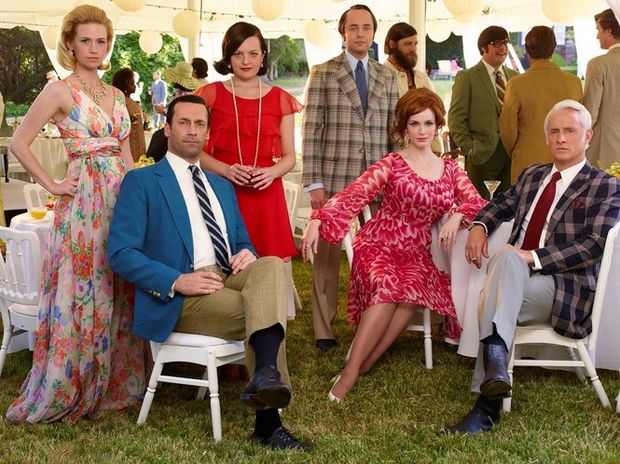
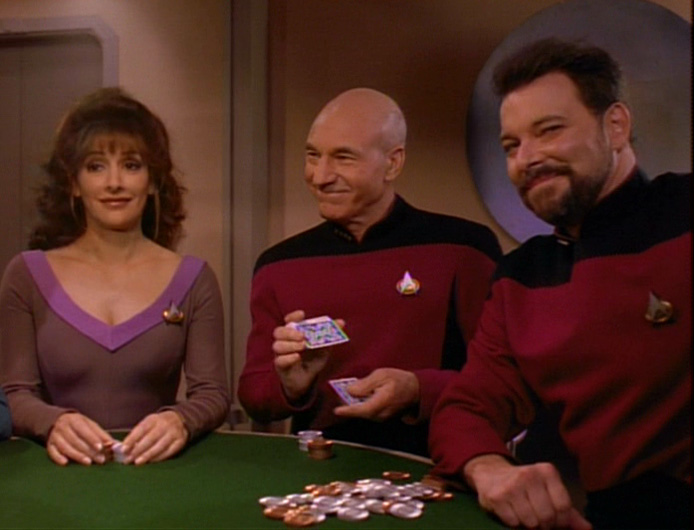
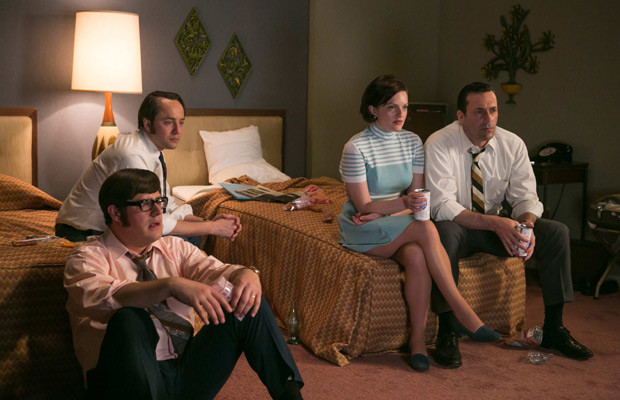
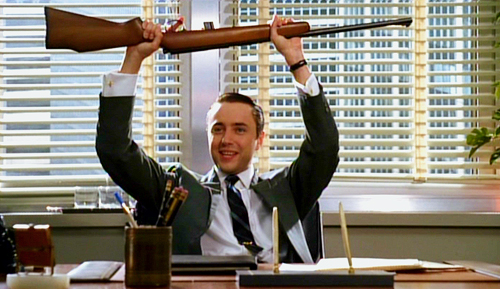
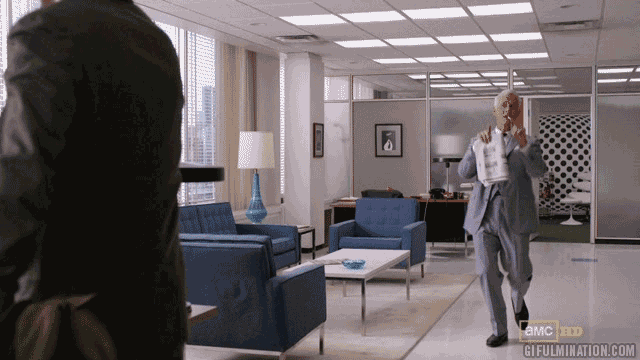
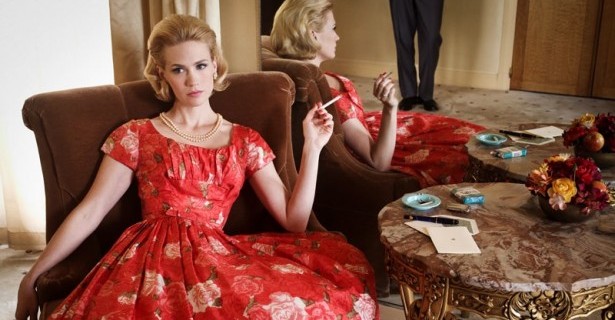
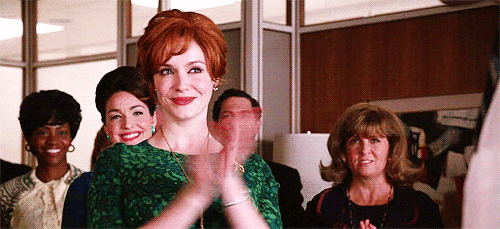
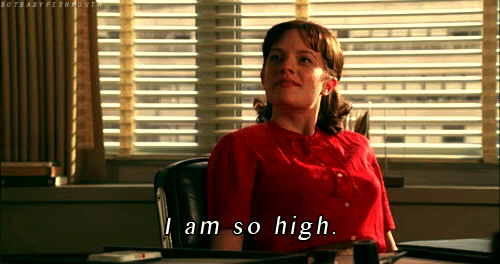
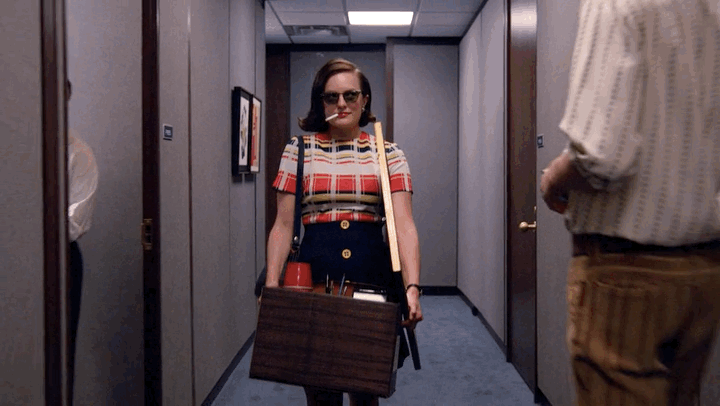

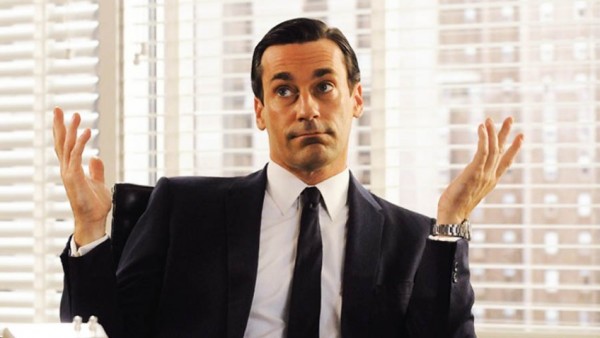
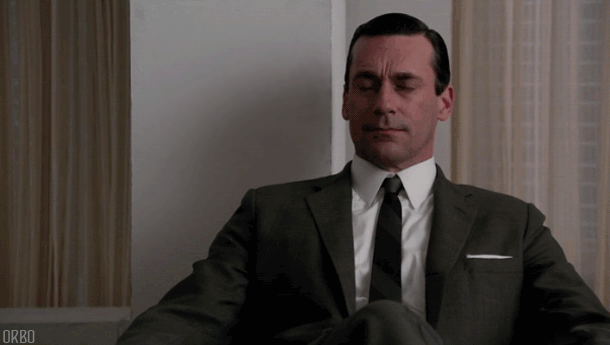
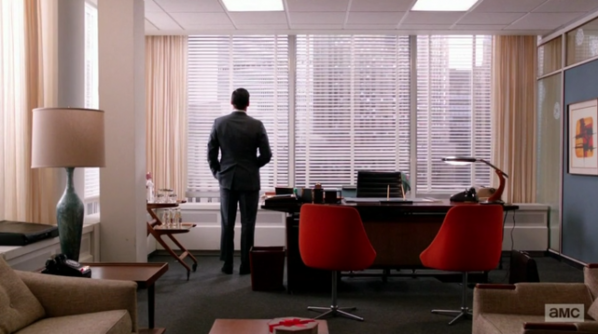
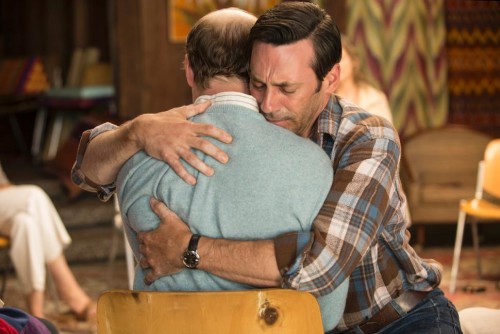
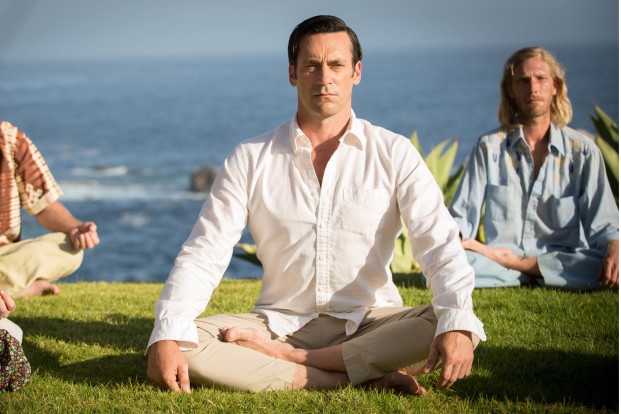
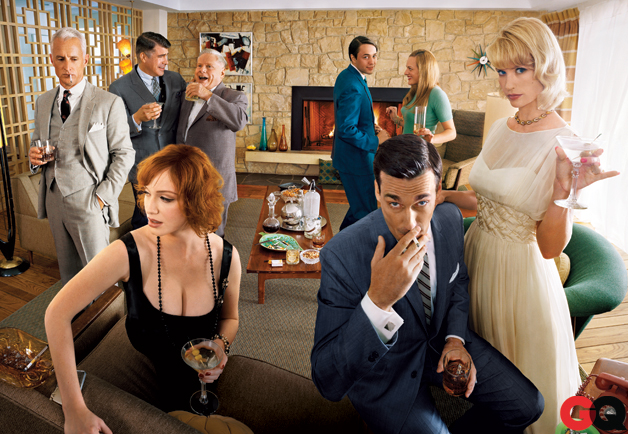
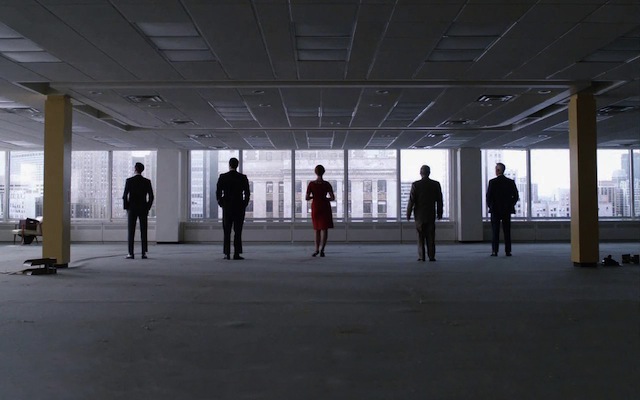
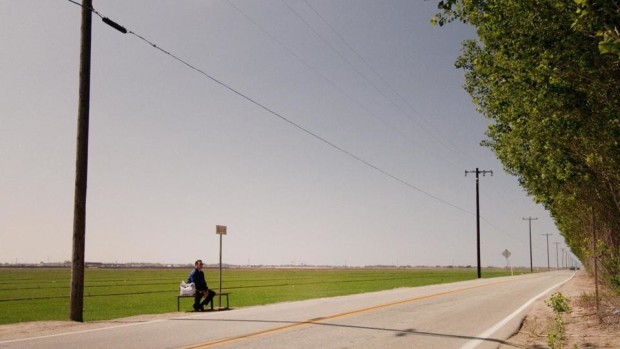
Comments